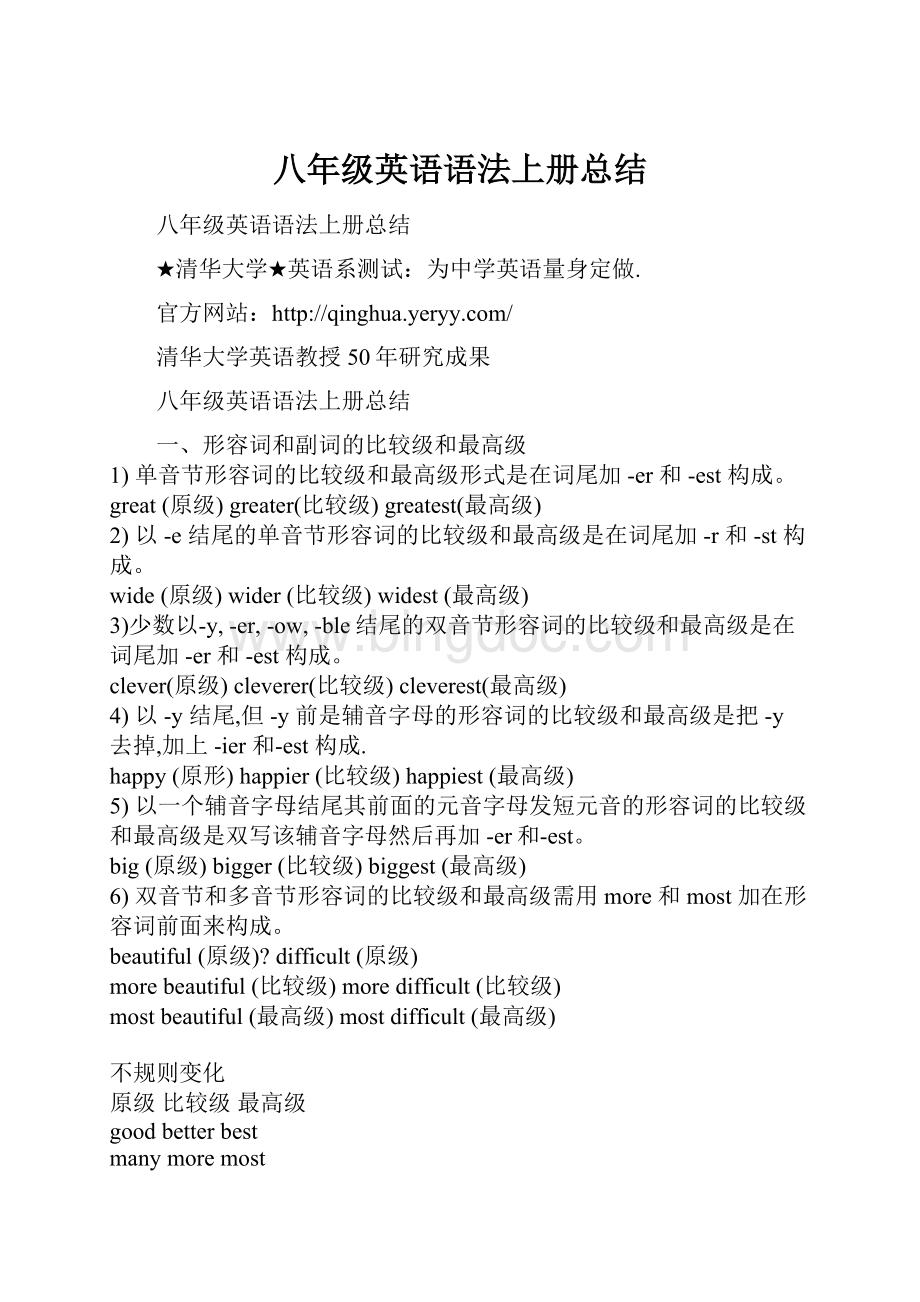八年级英语语法上册总结Word格式文档下载.docx
《八年级英语语法上册总结Word格式文档下载.docx》由会员分享,可在线阅读,更多相关《八年级英语语法上册总结Word格式文档下载.docx(47页珍藏版)》请在冰点文库上搜索。

farfarther(further)farthest(furthest)
deepdeeperdeepest
talltallertallest
形容词比较级的用法:
形容词的比较级用于两个人或事物的比较,其结构形式如下:
主语+谓语(系动词)+形容词比较级+than+对比成分。
也就是,含有形容词比较级的主句+than+从句。
注意从句常常省去意义上和主句相同的部分,而只剩下对比的成分。
形容词最高级的用法:
形容词最高级用于两个以上的人和物进行比较,其结构形式为:
主语+谓语(系动词)+the+形容词最高级+名词+表示范围的短语或从句。
二、句子成分
1、主语
主语表示句子主要说明的人或事物,一般由名词,代词,数词,不定式等充当。
2、谓语
谓语说明主语的动作,状态或特征。
一般可分为两类:
1),简单谓语
由动词(或短语动词)构成。
可以有不同的时态,语态和语气。
2),复合谓语:
情态动词+不定式
3、表语
4、宾语
宾语表示动作行为的对象,跟在及物动词之后,能作宾语的有名词,代词,数词,动词不定式等。
有些及物动词可以带两个宾语,往往一个指人,一个指物,指人的叫间接宾语,指物的叫直接宾语。
有些及物动词的宾语后面还需要有一个补足语,意思才完整,宾语和它的补足语构成复合宾语。
5、定语
在句中修饰名词或代词的成分叫定语。
用作定语的主要是形容词,代词,数词,名词,副词,动词不定式,介词短语等。
形容词,代词,数词,名词等作定语时,通常放在被修饰的词前面。
但副词,动词不定式,介词短语等作定语时,则放在被修饰的词之后。
6、状语
修饰动词,形容词,副词以及全句的句子成分,叫做状语。
用作状语的通常是副词,介词短语,不定式和从句等。
状语一般放在被修饰的词之后或放在句尾。
副词作状语时可放在被修饰的词前或句首。
三、句子类型:
1、简单句的基本形式是由一个主语加一个谓语构成。
2、复合句(ComplexSentence)由一个主句(PrincipalClause)和一个或一个以上的从句(SubordinateClause)构成。
3、两个或两个以上的简单句用并列连词连在一起构成的句子,叫做并列句,其基本结构是“简单句+并列连词+简单句”。
四、简单句的五种基本句型
基本句型一:
SV(主+谓)
基本句型二:
SVP(主+谓+表)
基本句型三:
SVO(主+谓+宾)
基本句型四:
SVoO(主+谓+间宾+直宾)
基本句型五:
SVOC(主+谓+宾+宾补)
五、宾语从句
在句子中起宾语作用的从句叫做宾语从句.宾语从句分为三类:
动词的宾语从句,介词的宾语从句和形容词的宾语从句.
1.由that引导的宾语从句。
That只有语法作用,没有实在的意义,在口语
和非正式文体中可以省略。
2.由连接代词who,whom,whose,what,which和连接副词when,where,why,how引导的宾语从句。
这些连接代词和连接副词在宾语从句中充当某个成分。
if或whether引导的宾语从句。
If和whether在句中的意思是“是否”。
初二上册学的宾从就是这些。
六、时态:
一.一般现在时:
(1)表示现在的状态,例如:
He’stwelve.
(2)表示经常性的或习惯性的动作,例如:
Igotoschooleveryday.(3)表示主语具备的性格和能力,例如:
Shelikesapple.常与often,usually,sometimes,always,everyday等表示经常性的或习惯性的时间状语连用.
1.肯定句结构:
(1)行为动词:
a.第一、二人称,复数人称:
They/We/You+动词原形...例如:
Theygotoschooleveryday.
b.第三人称单数:
He/She/It+动词-s/es…例如:
Lilyoftenlikessinging.
(2)系动词(be):
Iam...They/We/Youare…He/She/Itis…
2.否定句结构:
They/We/You+don’t+动词原形...例如:
Theydon’tgotoschooleveryday.
He/She/It+doesn’t+动词原形…例如:
Lilydoesn’tlikesinging.
在is/am/are后加not例如:
Iamnotaworker.
3.一般疑问句结构:
Do+they/we/you+动词原形...
例如:
Dotheygotoschooleveryday?
(Yes,theydo.No,theydon’t.)
Does+he/she/iIt+动词原形…
DoesLilyoftenlikesinging?
(Yes,shedoes.No,shedoesn’t.)
把is/am/are提在主语前.
Areyouaworker?
(Yes,Iam.No,I’mnot.)
二.现在进行时:
表示现在正在进行的动作或发生的事情.常与now,look…,listen…等表示现在状态的时间状语连用.
1.肯定句结构:
主语+is/am/are+动词-ing…
Theboysareplayingfootballnow.
在is/am/are后加not
Theboysaren’tplayingfootballnow.
把is/am/are提在主语前.
Aretheboysplayingfootballnow?
(Yes,theyare.No,theyaren’t.)
三.一般过去时:
表示过去某个时间发生的动作或存在的状态.常与yesterday…,last…,…ago,in1990等表示过去状态的时间状语连用.
主语+动词的过去式…
Thetwinswenttoschooltwohoursago.
(2)系动词(be):
I/He/She/It+was…They/We/You+were…
Iwasathomelastnight.
主语+didn’t+动词原形…
Thetwinsdidn’tgotoschooltwohoursago.
在was/were后加not
Iwasn’tathomelastnight.
Did+主语+动词原形…?
Didthetwinsgotoschooltwohoursago?
(Yes,theydid.No,theydidn’t.)
把was/were提在主语前.
Wereyouathomelastnight?
(Yes,Iwas.No,Iwas’t.)
四.一般将来时:
表示将来某时将要发生的动作或存在的状态,也表示将来经常或反复发生的动作.常与tomorrow…,next…等表示将来状态的时间状语连用.
(1)用于书面语:
主语+will+动词…
Wewillcometoseeyoutomorrow
(2)用于口语:
主语+am/is/aregoingto+动词…
TomisgoingtoseehisunclenextSunday.
在will后加not
Wewon’tcometoseeyoutomorrow.(willnot=won’t)
在is/am/are后加not.
Tomisn’goingtoseehisunclenextSunday.
把will提在主语前.
Willyoucometoseeyoutomorrow?
(Yes,wewill.No,wewon’t.)
把is/am/are提在主语前.
IsTomgoingtoseehisunclenextSunday?
(Yes,heis.No,heisn’t.)
五.情态动词:
can(能,会),may(可以,可能,也许),must(必须,一定,应该)
haveto(必须,不得不)
主语+can/may/must+动词…
Imustgonow.
在can/may/must后加not.例如:
Imustn’tgonow.
把can/may/must提在主语前.
Mustyougonow?
(Yes,Imust.No,Ineedn’t.)
MayIopenthewindow?
(Yes,youmay.No,youneedn’t.)
六.hadbetter+动词原形,表示“最好干……”,变否定句时在hadbetter后加not.
Youhadbettercatchabus.
You’dbetternotcatchabus.(Youhad=You’d)
七.动词不定式:
want/forget/remember/wouldlike/go+to+动词原形…
Iwanttogetbackmybook..
Lucywenttoseehismotherlastnight.
九.特殊疑问句的变换:
对划线部分提问时,将划线部分去掉,剩下部分变一般疑问句语序。
(对主语提问例外)
MynameisLily.What’syourname?
Theriveris500kilometres.Honglongistheriver?
为中小学生英语量身定做.
初三英语试题
第一部分听力测试(共20分)
一、听句子,选择正确的应答语。
每个句子读两遍。
(5分)
1.A.Let’sgo.B.Thisevening.C.Yes,Ihave.
2.A.Iamhungry.B.Withmybestfriend.C.Goodidea.
3.A.Lastyear.B.IlikeEnglish.C.Atschool.
4.A.Lastweek.B.Forayear.C.OK.
5.A.Athome.B.IlikeEnglishsongs.C.JohnDenver.
二、听对话及问题,选择最佳答案。
每段对话和问题读两遍。
6.A.Onthefourteenthfloor.B.Onthetwelfthfloor.C.Onthetenthfloor.
7.A.February29.B.February28.C.March1.
8.A.English.B.Chemistry.C.History.
9.A.Hehadacough.B.Hehadaheadache.C.Hefeltcold.
10.A.50yuan.B.15yuan.C.35yuan.
三、听对话,回答问题。
每段对话读两遍。
听第一段对话,回答第11—12小题。
11.Wheredoesthewomanwanttogo?
A.ThePoliceStation.B.TheEnglishCorner.C.CenterStreet.
12.Inwhichdirection(方向)doesthewomanhavetoturnatthenextcorner?
A.Totheright.B.Totheleft.C.Tothesouth.
听第二段对话,回答13—15小题。
13.Whoarethetwospeakers?
A.Husbandandwife.B.Teacherandstudent.C.Shopkeeperandbuyer.
14.Whatcolortrousersdidhebuy?
A.Blacktrousers.B.Browntrousers.C.Whitetrousers.
15.Howmucharethetrousers?
A.$45.B.$35.C.$46.
四、听短文,选择正确答案。
短文读两遍。
16.Wherewastheoldwoman’shouse?
A.Inatown.B.Onafarm.C.Inavillage.
17.Whowastheoldwomanhavingdinnerwith?
A.Byherself.B.Herchildren.C.Bill.
18.Whendidtheyoungmancomebackagaintotheoldwoman’shouse?
A.Tenmonthslater.B.Tenyearslater.C.Tenweekslater.
19.Whatwastheyoungman’sjoblater?
A.Acook.B.Afarmer.C.Aworker.
20.Whatdoyouthinkoftheoldwoman?
A.Kind.B.Bad.C.Sick.
第二部分笔答题(共80分)
五、单项选择(20分)。
21.-WillyouwatchtheWorldCupmatchthisyear?
-No,butI________severalWorldCupmatchessinceIwasasmallkid.
A.hadseenB.sawC.wasseeingD.haveseen
22.Istudyby_____withagroup.
A.workB.workingC.toworkD.toworking
23.-Haveyoucleanedyourroom?
-____________.
A.Yes,Ido.B.No,Idon’t.C.Notyet.D.No,Ididn’t.
24.Iwilleatrice,meat______noodles.
A.insteadofB.steadofC.insteadforD.insteadby
25.Tongisoneofmyfavoritebasketball_______.Heis_________ourschoolbasketballteam.
A.player;
onB.player;
inC.players;
onD.players;
in
26.Themaninthewhitecoatisn’tadoctor,________hiswife.
A.soisB.issoC.neitherifD.isneither
27.Tom______totaketheexamlaterbecausehewasill.
A.allowsB.allowedC.isallowedD.wasallowed
28.Couldyoutellme_______in2008.
A.wheredoessheliveB.whereshelivesC.wheredidsheliveD.whereshelived
29.-Doyoustillremember_______mesomewhereinShanghai?
-Yes,ofcourse.Twoyearsago.
A.toseeB.seeC.seeingD.saw
30.Thisisthemostbeautifulcard________Ihaveevergot.
A.whichB.thatC.itD.what
31.DoyouknowMrBrown________daughterisafamoussinger?
A.thatherB.whoseC.whoD.whom
32.-Wouldyoulikeacupoftea?
-_______.
A.No,thanks.B.Ithinkso.C.That’sallright.D.Yes,OK.
33.I_______someclothstocharitybecausetheyweretoosmallforme.
A.hungoutB.tookoutC.putoffD.gaveaway
34.-Howmanystudentsarethereinyourschool?
-______thestudentsinourschool________-overtwothousand.
A.Thenumberof;
isB.Thenumberof;
areC.Anumberof;
isD.Anumberof;
are
35.Ican’tfindtoday’newspaper.Maybesomeone_______itaway.
A.takesB.willtakeC.hastakenD.istaking
36.-It’snineo’clocknow.Imustgo.
-It’srainingoutside.Don’tleave________itstops.
A.whenB.afterC.whileD.until
37.Weallwenttothepark________Johnbecausehewasillinbed.
A.withB.besidesC.exceptD.beside
38.ThisisPeter’book.Please__________.
A.giveittohim.B.giveithimC.givehimtoitD.give
39.Thisstreetisn’t______.Therearemanybusesandcars.
A.quiteB.busyC.quietD.long
40.MoststudentsinAmericaenjoy______popmusic.
A.listeningtoB.tolistentoC.tohearD.hearing
六、阅读理解。
(每小题1分,共15分)
阅读下列短文,做出正误判断或选出最佳答案。
A篇为判断正误,正确的选“A”,错误的选“B”,B篇为选择题,C篇为任务型阅读。
A
Anappleadaykeepsadoctoraway.Haveyoueverheardanyonesaythis?
Doyouthinkifpeopleeatoneortwoapplesadaytheywon’tgetsick?
Lastyearsomescientistswantedtofindoutifthisoldsayingistrue.Theydividedacollegeclassintotwogroups.Thefirstgroupate2applesaday.Thesecondgroupdidn’teatapples.Aftersixmonthstheyaddedupthetimestheyoungpeoplegotsick.Theappleeatersturnedouttobehealthierthanthosewhohadn’teatenapples.Itseemedtoshowthatan